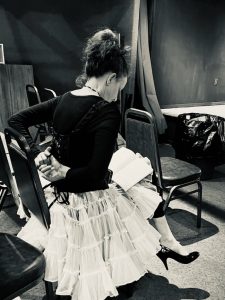TIPS FOR DIRECTORS
OR
How To Look Like You Know What You're Doing Even If You're Flying by the Seat of Your Pants
by Stacey Greenawalt, who is most often flying by the seat of her pants

THIS LIST began many years ago as a Letter to My Future Director Self. I was an actor who had the experience of working with some amazing directors who modeled exceptional leadership and vision, but also some directors who were very unprepared/ temperamental/ inflexible/ quixotic (at a variety of different theatres). If some of these points are a little oddly specific, there is undoubtedly a story behind it. I came home from rehearsals with difficult directors very frustrated many times, so the letter/list was a coping mechanism, perhaps? Write it out. Make notes so I could do my best not to be that difficult director. The list evolved over more than a decade (shoot, it's STILL evolving), so that when I eventually had the opportunity to direct, at least in this regard I was NOT flying entirely by the seat of my pants.
BEFORE AUDITIONS
1 Know your script before auditions. I know this sounds like a gimme, but you should have read the script at least four times before auditions. Research the facts of the story. If it's set in 1948 England, know what is happening in 1948 England—and the rest of the world. What historical events might have had an impact on the character's lives? Why did the author choose to tell this story, and why did he/she choose the words he did?
2 Before auditions, have a good feel for the show. Have some idea of the set sketched with important pieces drawn in more detail. Have some blocking worked out on that set. Know the general feel of the costumes and the overall mood of the show. Know what props are essential and why. Even if you have directed/done the show before, approach with fresh eyes.
3 Make sides available, along with details about the show and its characters. Cold reads do nothing but make actors nervous. It's okay to throw a cold read into the audition mix, but having sides allows actors to prepare.
4 Put together a tentative rehearsal schedule. Actors need to know the time commitment, preferably before they choose to audition.
AT AUDITIONS

5 Be on time and ready to go. Again, seems like a gimme, but believe me, it bears articulating.
6 Discuss expectations. New actors may not know how things generally work, and every director is different. You may have different rehearsal expectations than I do, so discussing those at auditions helps mitigate misunderstandings down the line.
7 CAST NEW FACES!, Yes, it may be a risk, but if you always cast the same people, or the same small group of actors in your lead roles, you're sending a message to other actors: "Don't even bother to show up for future auditions." Cast people of color, cast people from other theatres. Diversity is good for the theatre.
REHEARSALS
8 Do an initial read-through, or table read. Vocally set the scene as you anticipate it will be, so from the very first rehearsal, the cast has an idea of what you envision. However, please do communicate that producing a show is a collaboration between you as director, the actors, and the tech/creative teams.
9 Share with your cast the history of the show, particularly if it's a classic Broadway script (musical or not). Give them some background on the author, about the show's stage history, about some of the various actors who have played the principal roles, and perhaps some of the different qualities each actor brought to their characters. While you are in no way attempting to 'copy' earlier productions, classic shows carry with them a certain burden of audience expectations, a responsibility to do the show justice, and every cast member must share in that burden/responsibility.

10 After the read through, encourage actors to thoroughly read the script again at least twice more before the next rehearsal. Tell them to look for character and inter-character dynamics that are necessary to the plot and/or flow of the story. Those key aspects are not always reflected just in their own actions/lines, but sometimes in things other characters do/say.
11 Give actors some agency in their characterization. Aside from specific traits written into the script or integral to the character (like Quasimodo's hunch), allow the actor some freedom to bring his or her own interpretation to the role. If you and the actor have very different views, find a compromise and through the following rehearsals, initiate two-way communication about what's working and what isn't. ALSO: Remember that you're working with a stage script and not re-enacting the movie. Different actors bring different qualities to their characters, and attempting to make them echo the movie character is unfair. ALSO ALSO: Work with actors on costume and prop decisions that affect an actor's characterization.
12 Encourage communication from the start. Make sure actors have your phone number and email address, and let them know it's okay to ask questions about characterization, blocking, accents, etc.
13 Model effective leadership. Remember that your actors are here giving of themselves because they love what they do. The cast will work better when they feel like they're sharing in a common journey, and that you're on the journey as well, rather than dragging them all along.
14 Block all scenes as early as possible, and run all dialogue scenes at least once a week, so actors are familiar with the spacing, pacing, and blocking of their lines and have ample opportunity to practice onsite. Effectively memorizing lines involves more than just rote memorization. A great deal has to do with how the lines are paced in the scene, what other characters are saying, how other lines are played, and any actions that may go along with the lines. It's a total brain thing. At home, actors can certainly memorize lines by rote using their own tempo and cadence as a memory aid. But when those actors are on stage in the scene and the lines are spaced differently, paced differently, played differently, and stage direction is added, the home rote-memorization can fly out the window.
15 It's okay to change your mind. It's bound to happen as rehearsals unfold and you see that this or that won't work as you'd envisioned. But be sure to communicate changes effectively. Changing your mind without remembering to COMMUNICATE that you have changed your mind only creates frustration for everybody. When you change up the direction given, consider prefacing the change with "You're doing what was directed, thank you, but it's not working. Let's try something different."
ABOUT THE AUTHOR
 STACEY GREENAWALT
STACEY GREENAWALT
Stacey has directed many shows at LWA, including THE 39 STEPS, A CHRISTMAS CAROL, CLUE, AROUND THE WORLD IN 80 DAYS, and others. She's been active in the DFW theatre community since 2011 as actor, director, costumer, prop designer, scenic painter, and set designer. She's been nominated for Column Awards in both acting and design. Favorite roles include Lotty Wilton in ENCHANTED APRIL, Miss Hannigan in ANNIE, Ronnette in LITTLE SHOP OF HORRORS, and both Yente and Fruma-Sarah in two different productions of FIDDLER ON THE ROOF. When not on stage, Stacey is owner and Chief Egghead at Punk Poultry Media. You can find her DFW theatre resume on her website at StaceyGreenawalt.com

